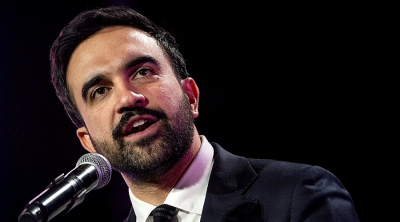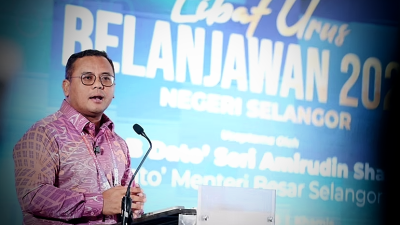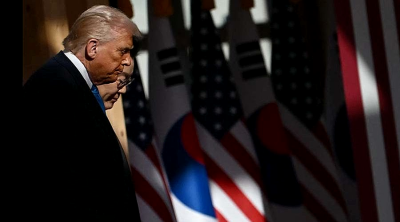The Nobel Prize announcements will be made from October 6 to 13, and many are fixated on the winner(s) of the Nobel Peace Prize.
The announcements will be broadcast live on the official Nobel Prize channels.
Malaysian Prime Minister Datuk Seri Anwar Ibrahim had claimed that the Thailand-Cambodia ceasefire was a collective effort involving many heads of governments of Asean member states.
Some in Asean wanted to nominate the Malaysian Prime Minister to share the Nobel Peace Prize with President Trump.
However, US President Donald Trump had claimed to have unilaterally brought a halt to the border clashes between Thailand and Cambodia when many in Asean felt that as the Asean Chair Datuk Seri Anwar Ibrahim should be credited for his quick response despite domestic troubles, to seek a compromise between the two combatant countries.
Anwar is in a better position to understand the causes leading to the border clashes and how to resolve the tensions through a more comprehensive peace initiative.
However, there was not much opposition to President Trump’s claims and the matter did not become a controversy especially with Asean members tariff-ied by the US president’s unprecedented and unreasonable hikes in tariffs worldwide.
Issues such as the insurgency in southern Thailand, political problems concerning Myanmar or the South China Sea claims by Asean nations should be better resolved by the bloc’s members instead of by other faraway mediators.
Furthermore, the US president is very keen to be awarded the Nobel Peace Prize, and without any embarrassment unilaterally declared that he stopped the recent India-Pakistan war that could have escalated into a major conflict between the two nuclear-armed nations.
There were many debates and polemics in the overactive and lively Indian media as to whether it was President Trump who forced both nations to opt for a ceasefire.
The vibrant Indian media was awash with controversies as to whether it was Trump who really stopped the escalation or whether the leaders of both India and Pakistan opted for a ceasefire before serious escalations could occur.
Whatever it is, this claim has become one more supporting credential for President Trump’s claim on the 2025 Nobel Peace Prize.
Additionally, Trump also harps on a Third World War breaking out any moment, and is at the same time insisting on the Nobel Peace Prize! What a contradiction!
Trump also claims to have stopped five conflicts—between Israel and Iran, India and Pakistan, Egypt and Ethiopia, Serbia and Kosovo— and Cambodia and Thailand—in the last few months!
He even stated that he had stopped the Azerbaijan-Armenia crisis from blowing up into a war.
The Nobel Peace Prize has become more controversial and its value diluted over the years. It is in this situation that Trump is clamoring for the prize.
Nevertheless, he has not been able to end the Russia-Ukraine conflict, which sometimes now escalates to dangerous levels, when it must be remembered that he stated that the war would be stopped on day one as soon as he assumed office, which was one of Trump’s primary pledges in his presidential campaign.
Instead, Trump has now turned against India for buying Russian oil for the delay in ending the Ukrainian war, by imposing 50 percent tariffs on a shell-shocked India.
The US will soon lose the longstanding friendship with India, which now concentrates more on the BRICS and SCO partnerships.
India could also get out of the Quad set-up specifically created to check China in the Indo-Pacific.
Despite the “Howdy-Modi” theme symbolizing the earlier Trump-Modi friendship, Trump has been hounding Modi since taking office!
This is the first time a leader is staking a claim to the Nobel Prize when it is normally awarded by the Selection Committee after a due process of identifying people who have brought about settlement of a conflict or have initiated a peace process, such as the case with Yasser Arafat, Yitzhak Rabin and Shimon Peres for the Oslo Accords; or Henry Kissinger and Le Duc Tho in 1973 for ending the Vietnam War, as well as others championing international humanitarian and environmental causes.
There have been petitions by some Indian NGOs against Trump being selected for the award.
World leaders and diplomats stand a better chance to win the Peace Prize as they are in a better position as mediators or peacemakers.
The Peace Prize is a big incentive for leaders and organizations to take the initiative to bring peace or for other globally noteworthy causes.
However, in recent times the choice of recipients has resulted in controversies and polemics as many dispute the selections.
President Obama was awarded the Peace Prize in 2009 at a time the US decided to escalate the war in Afghanistan from 2010 onwards.
The Nobel Peace Prize in recent times has been awarded to controversial figures such as dissidents, activists and opposition leaders and this has angered nations the recipients belong to, such as China and Iran.
The 2014 prize was awarded to Malala Yousafzai who was too young at 17 years of age to realize the deep meaning attached to the prize.
The late Rajendra Pachauri, who won the Peace Prize in 2007 together with Al Gore on behalf of IPCC, was subsequently involved in sexual harassment cases which dented his international reputation.
Needless to say, the Peace Prize has become more controversial and its value diluted over the years. It is in this situation that President Trump is clamoring for the prize, and chances are that he will get it in order for the Norwegian Nobel Committee to avoid Trump’s angst.
If not, Trump could impose additional tariffs on the Nobel Prize giving nations, Norway and Sweden!
In my opinion, Trump should be given the 2025 Economics Prize as he has weaponized the tariffs as an economic tool to devastating effect worldwide.
Such is Trump’s quest for the Nobel Prize amidst a tariff-ied world!

(V. Thomas has been regularly contributing to Malaysian newspapers for the last 40 years.)
ADVERTISEMENT
ADVERTISEMENT








































